Best sunrise alarm clocks: Cheerful wake-up lights for all budgets
Winter’s here but the best sunrise alarm clocks can make waking up in the dark a little easier.

Struggling to get up at the moment? The best sunrise alarm clocks can help you get going in these dark months. The clocks work by gently flooding your room with light, starting out with a deep orange color and then slowly working up to a bright, white shade that feels like dazzling sunlight. The theory is that this slow progression replicates a sunrise and should gently wake you as you sense the change in light.
Also known as wake-up lights or sun lights, they usually come with an array of alarm sounds that can be played once the light has reached its strongest point. This should mean that even deep sleepers will be rumbled out of bed, if the lighting trick hasn’t worked.
These devices can be particularly useful during winter, when the sun sometimes doesn’t rise before we do. They’re not to be confused with the best light therapy lamps, which are designed to alleviate the symptoms of seasonal affective disorder (SAD.) That said, sunrise alarm clocks can have benefits on our sleep patterns, which can improve mood and mental health.
If you’re looking to improve your sleep across the board, you might also want to consider getting one of the best mattresses or best pillows for your body type and sleeping patterns. For now, here’s our guide to the latest and best sunrise alarm clocks for a more natural wake-up call…
1. Philips SmartSleep Connected: Best sunrise alarm clock overall
Why you can trust Top Ten Reviews
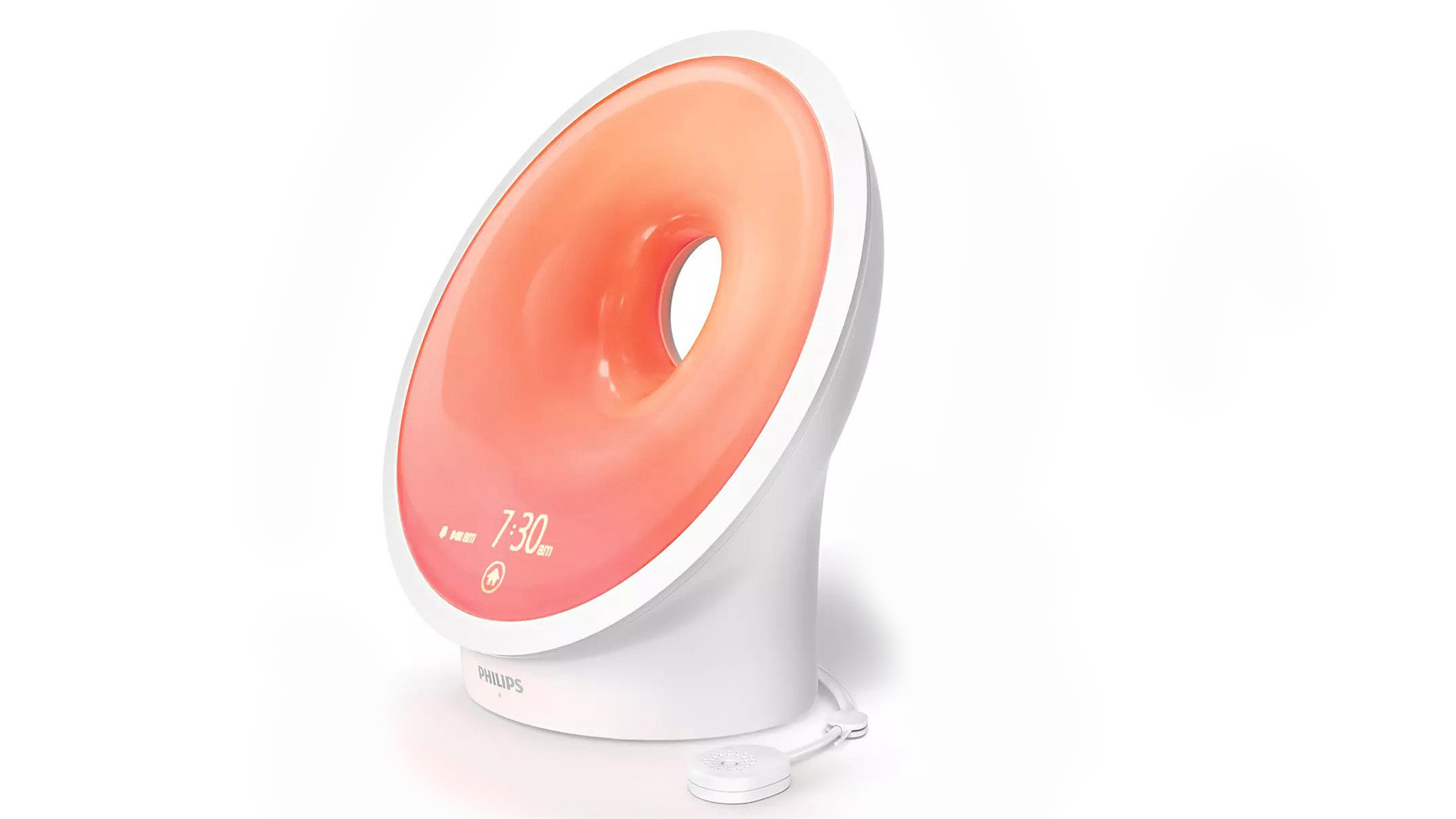
Philips SmartSleep Connected
Our expert review:
Specifications
Reasons to buy
Reasons to avoid
The general advice for a good night’s sleep is to switch off your gadgets and leave them out of the bedroom, so it might seem strange that Philips is asking you to stay connected. But with decades of expertise and the backing of a clinical sleep trial, Philips, which also makes some of the best electric toothbrushes, knows what its talking about.
The Philips SmartSleep Connected is dual light-therapy lamp and sunrise alarm clock packed with features including a built-in smartphone-enabled sensor. That advises on your ideal sleeping and waking environment by measuring the temperature, noise, light and humidity levels in your bedroom.
There is also RelaxBreathe, a light-guided breathing program that helps the body and mind relax and wind down. Meanwhile, Philips’ SleepMapper app allows you to personalize the alarm, light, sound, and sunrise and sunset themes.
This clinically validated wake-up light is easy to use and also includes an FM radio, power back-up, USB mobile phone charging, AUX dock with quality speaker and smart-touch display. At the end of the day – and the beginning of it too – Philip’s sunrise alarm clock and app makes light work of waking up.
2. Lumie Bodyclock Active 250: Best sunrise alarm clock for heavy sleepers
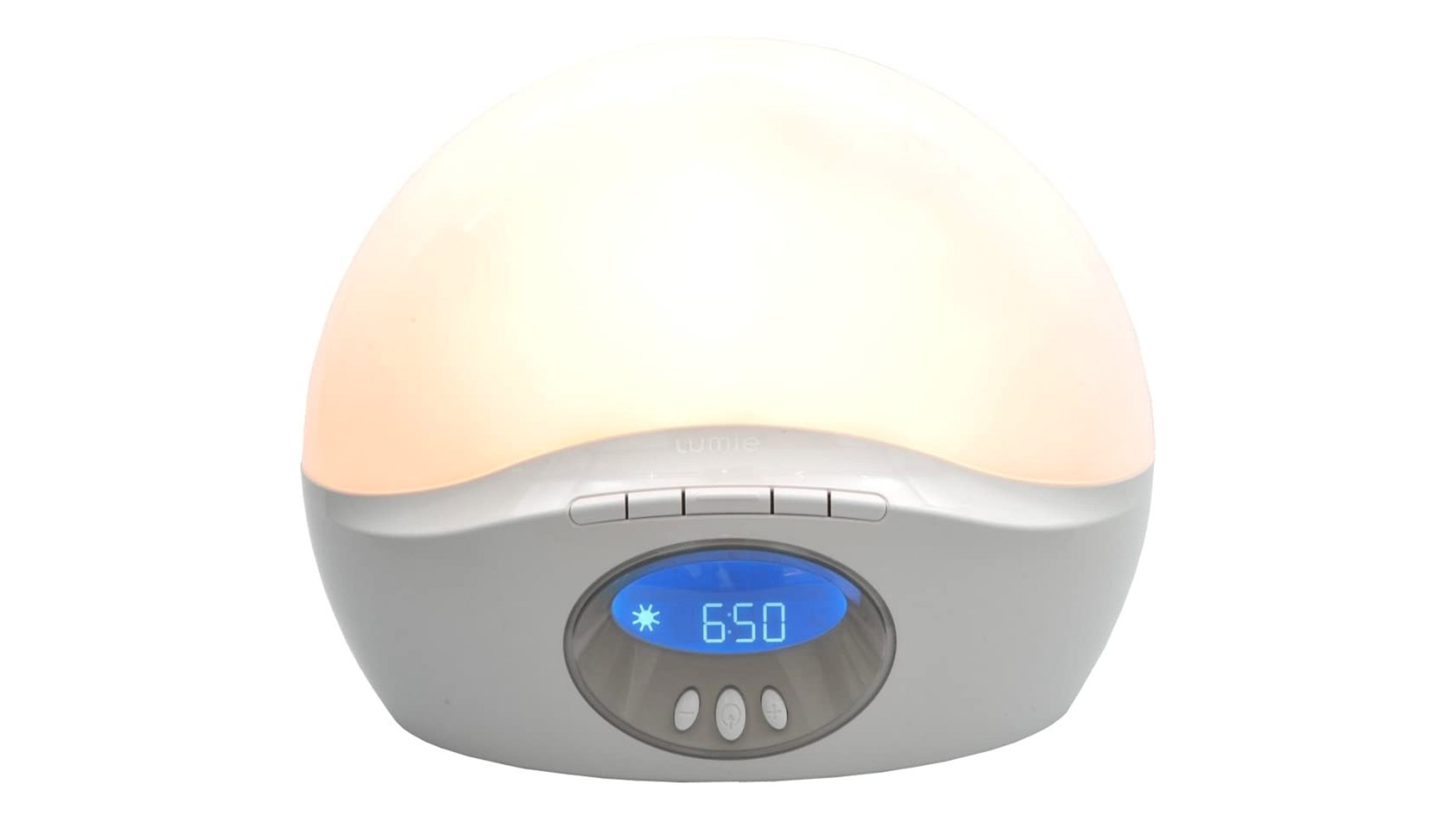
Lumie Bodyclock Active 250 Wake-Up Light
Specifications
Reasons to buy
Reasons to avoid
If you need a little something extra to make sure you rise and shine in the morning, try the Lumie Bodyclock Active 250, which wakes you up gradually with 'light that mimics the spectrum changes of a real sunrise'.
And if that doesn’t do it, the option of a rooster as a wake-up sound will definitely stir you from your slumber, especially when set at a louder volume. There is also an FM radio if you fancy some news or music too.
The wake-up time can be programmed up to 90 minutes before you need to get up, giving you plenty of time to wake refreshed, and there is also the option to set the light to flash once the sunrise sequence has finished.
The clock also has plenty of gentle options including dimmable lighting and a white-noise setting, plus it also doubles up as a gentle bedtime reading lamp and can be programmed to come on as a security light for when you’re away overnight.
3. HeimVision Sun Alarm Clock: Best sunrise alarm clock on a budget
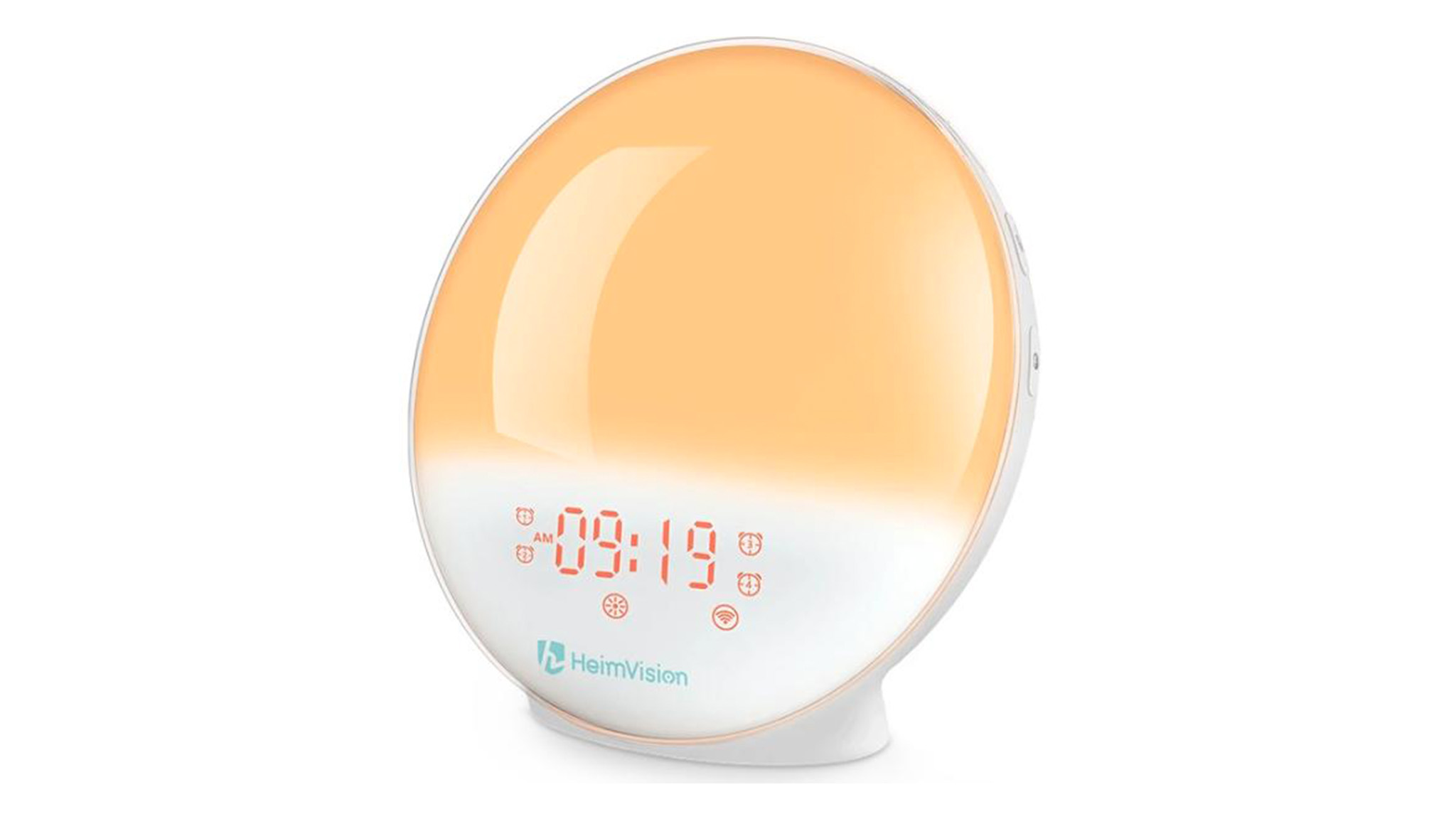
HeimVision Sunrise Alarm Clock
Our expert review:
Reasons to buy
Reasons to avoid
This smart sunrise alarm clock has all the features you need to sleep better and wake up feeling refreshed, including a soothing red-tinted light that gradually transforms into white light to copy natural sunlight. Meanwhile the dual alarm can be set to four separate wake-up times with seven different types of alarm sounds to choose from.
Other features include a convenient USB charging port, FM radio and a 15-minute snooze option, but we really love the fact this clock doubles up as a bedside lamp with the right amount of glow to read by.
If you like to stay connected, the HeimVision sunrise alarm clock also pairs with the Smart Life app (available on the App Store and Google Play) so you can control the clock and set the alarms from your phone.
The clock also pairs with Alexa and Google Home. But if you prefer to keep your phone off the bedside table, then this gadget is just as easy to operate without the app too.
- Read our HeimVision A80S Wake-Up Light review
4. Philips SmartSleep HF3520/60: Best sunrise alarm clock for seniors
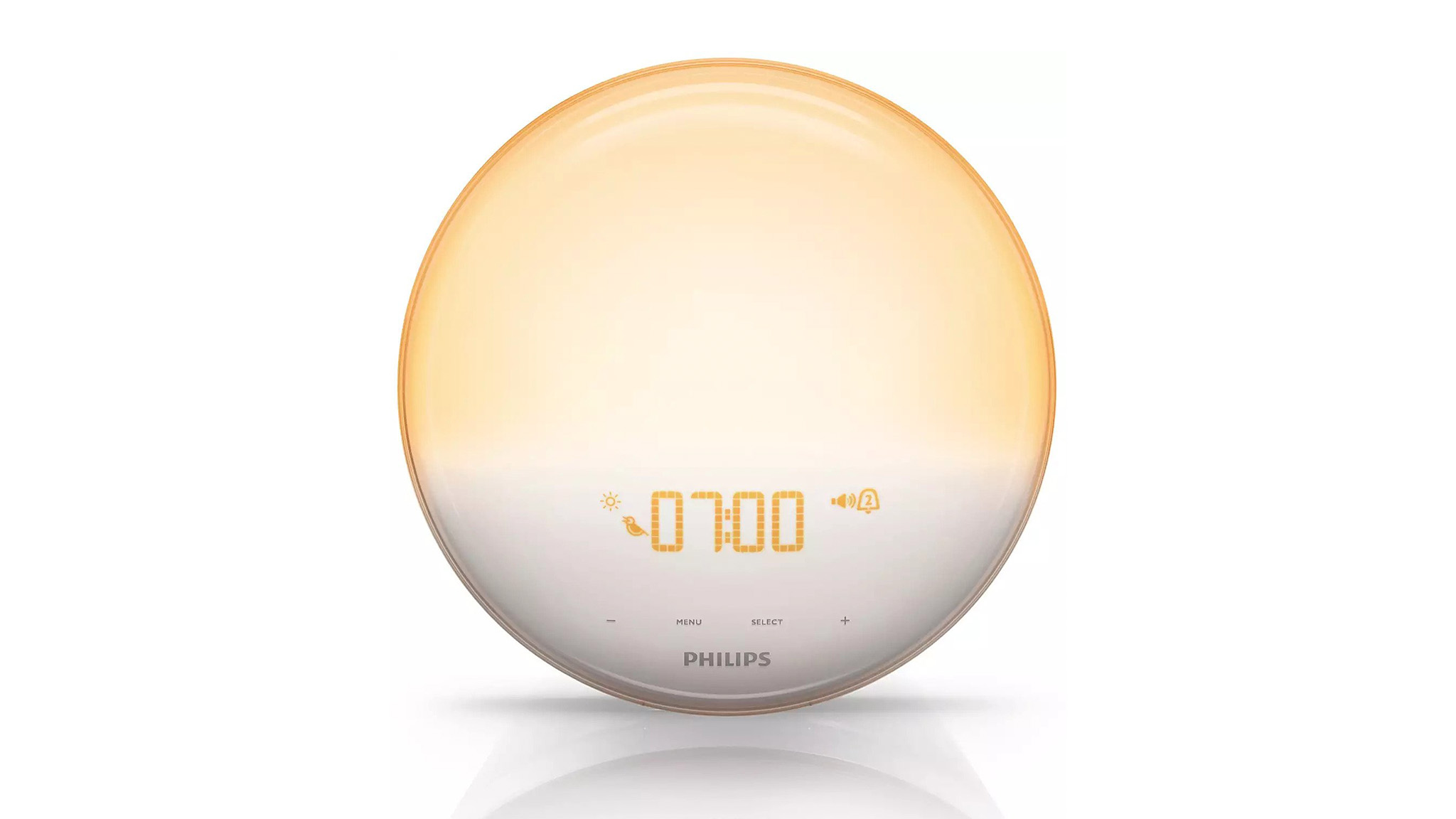
Philips SmartSleep Wake-Up Light HF3520/60
Specifications
Reasons to buy
Reasons to avoid
The sunrise simulation, natural wake-up sounds and FM radio on this device offer a pleasant way to start the day. What’s more Philips says its best-selling alarm clock has been clinically proven to help you wake up feeling more refreshed.
The clock comes with two alarms and a decent range of brightness levels. The snooze function is easy to use with a simple tap, while your chosen wake-up sound will gradually increase in volume. You can choose between the five wake-up sounds of ‘Forest Birds’, ‘Buddha’, ‘Yoga’, ‘Ocean Waves’, and ‘Nepal Bowls’, all of which are as peaceful as they sound.
Philips has more than a hundred years of expertise when it comes to lighting, and, as such, this wake-up light comes with plenty of research and knowledge. In fact, Philips claim that in a test of 477 users, 88 percent say that using their Philips Sunrise Alarm is better than their previous way of waking up.
5. LBell 7: Best sunrise alarm clock with built-in night light
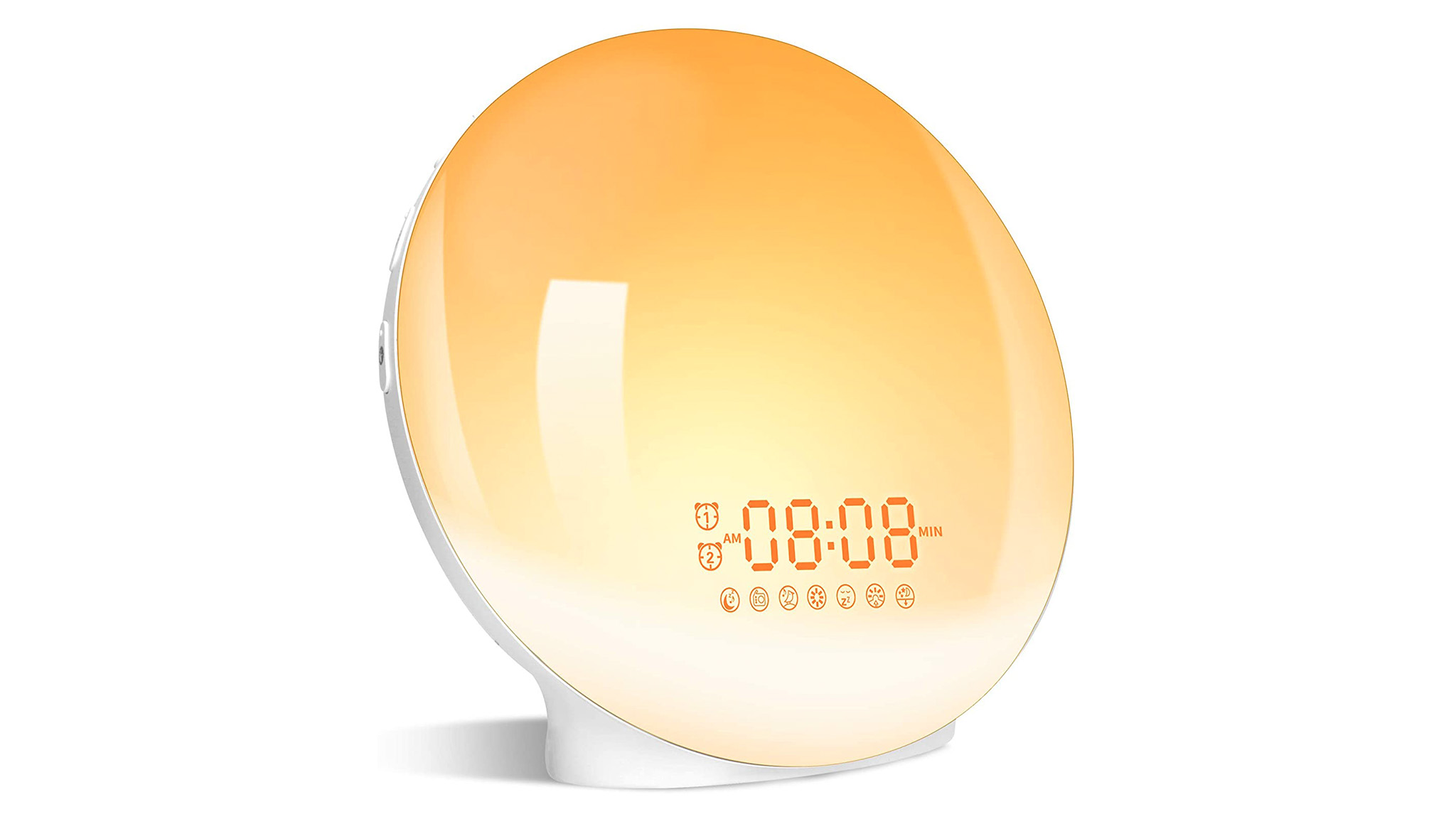
LBell 7 Night Light and Sun Alarm Clock
Specifications
Reasons to buy
Reasons to avoid
For some, waking up to the radio can be a really great start to the day, and if you agree then this sunrise alarm clock is the perfect choice for you.
The LBell 7 offers no less than 40 presets for your favorite radio channels. And it’s easy to set up too – simply hold down the FM button for two seconds and it will automatically scan the stations for you to listen to, set as an alarm or use as a sleep aid.
There are also plenty of other things to love about LBell’s feature-packed sunrise clock, including seven light colors, sunrise and sunset simulation, dual alarm clocks, seven alarm tones, three sleep sounds, adjustable brightness on the time display and a snooze function.
The clock also gradually dims as you are drifting off to sleep – it’s a dreamy glow that’s hard to resist.
6. Coulax Wake-Up Light: Best sunrise alarm clock with nature sounds
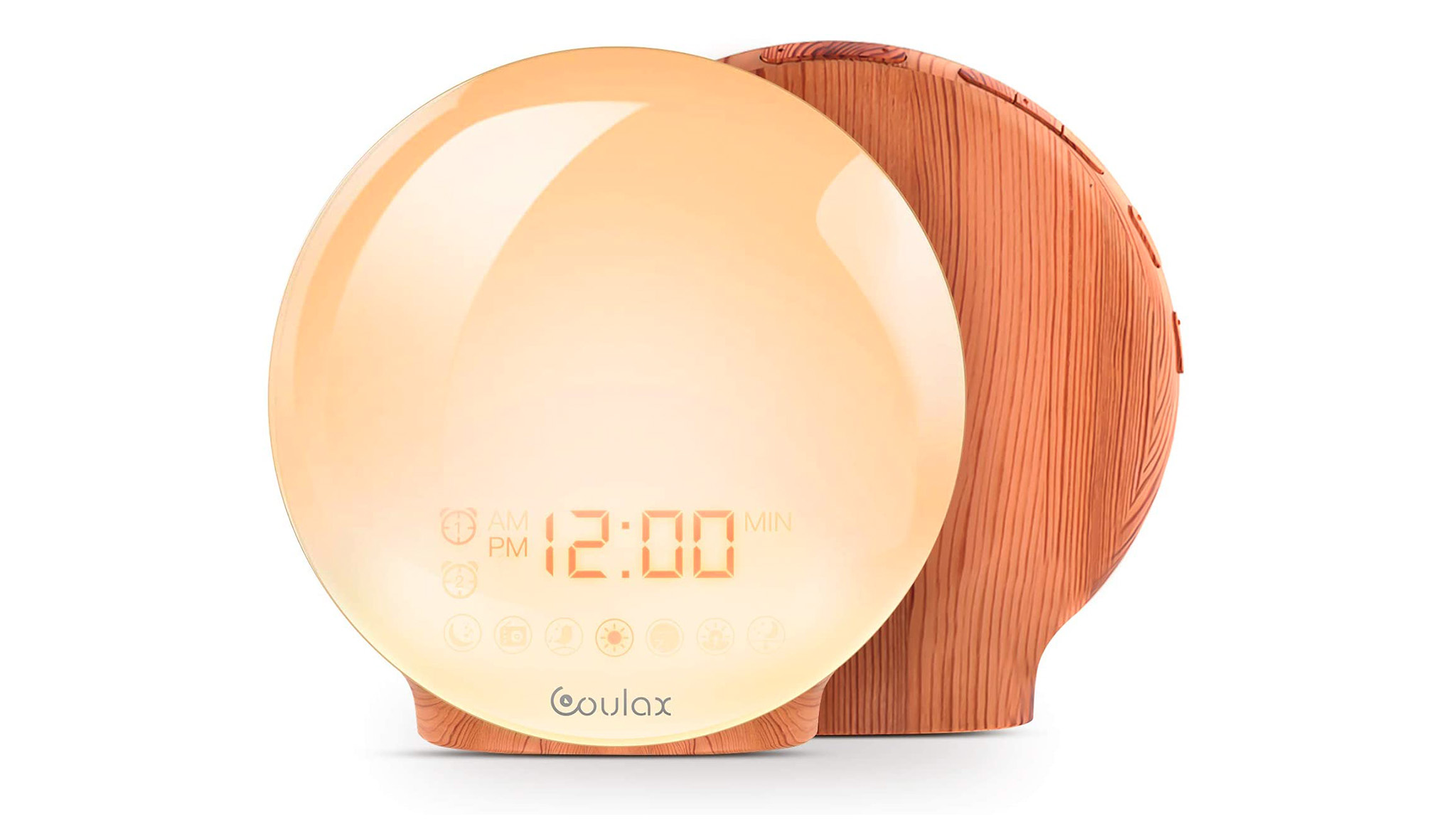
Coulax Wake-Up Light
Specifications
Reasons to buy
Reasons to avoid
If you don’t find waking up easy, why make it harder on yourself with piercing beeps from your mobile phone or digital alarm clock? Coulax’s soothing wake-up light offers a lovely way to bring you into the day, with seven gentle sounds that include ‘Bird’, ‘Ocean’, ‘Stream’ and ‘Windbell’ as well as soft music, piano music and beeps. There is also an FM radio for when you are ready to kickstart the day.
In keeping with the natural theme, this Coulax clock has a subtle wood finish, and the sunrise and sunset simulation uses LED light to gradually increase the brightness from warm red to bright white to wake you within your chosen time (from ten minutes up to sixty).
The lamp also features seven different gentle colors, so you can add atmosphere to your sleeping area. And when it’s time to nod off, the light will dim from your chosen brightness level to help you get the sleep you deserve.
This is our recommendation as the best wake-up light for couples because you can set the dual alarms to go off at two different times. That's handy if one of you gets up earlier than the other.
7. Homelabs Sunrise Alarm Clock: Best sunrise alarm clock for kids
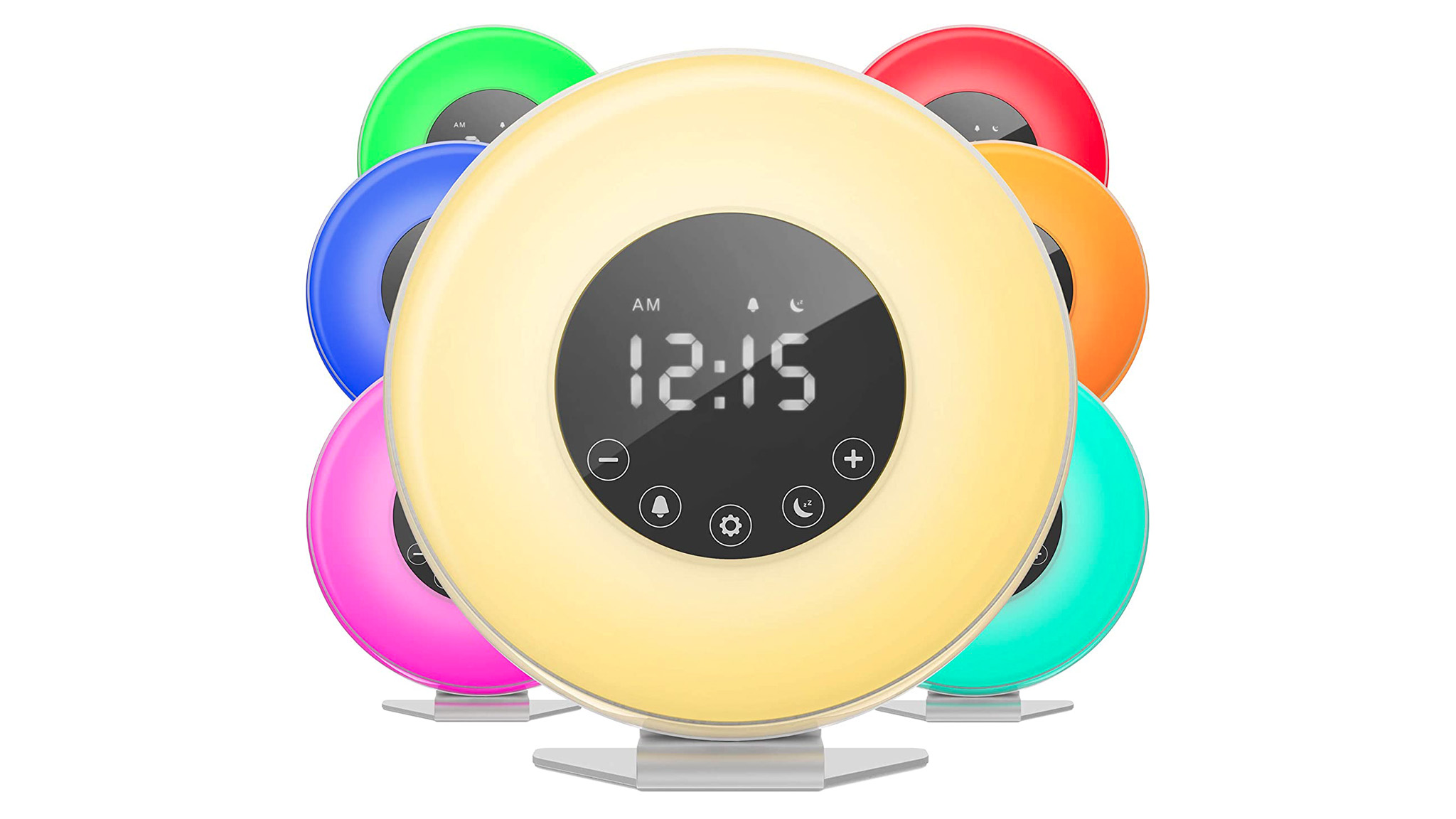
Homelabs Sunrise Alarm Clock
Specifications
Reasons to buy
Reasons to avoid
The HomeLabs Sunrise Alarm Clock is a firm favorite with kids and parents alike. Not only will the colored lights add a playful element to the little one’s bedroom, but the gentle wake-up alarm is great for getting them up in time for school… and for making sure they don’t rise too early at the weekend either!
The sleep timer gently mimics sunset to dim the lights as your child drifts off to sleep – ideal if they’re not a fan of the dark. Meanwhile the eight colorful light options are easy to switch between, ready to use as a bedside lamp when it comes to stories at bedtime.
The sound options include birds, ocean and lullaby to make sure sweet dreams are had all round. Extra features are an FM radio and three brightness settings, although a few more brightness levels would be welcome.
Today's cheapest prices on the best sunrise alarm clocks
Sunrise alarm clocks FAQ
Sunrise alarm clocks vs alarm clocks: Key differences
A lot of us rely on alarms to wake us up in the morning – these can be digital, on our smartphone or via a good old-fashioned wind-up clock – either way, they’ll usually have a noise to jolt you out of your slumber. And, as effective as this is, it can be a bit of a rude awakening.
While sunrise alarm clocks also feature alarms, they also introduce the option of light, which gradually brightens or dims, while changing color to mimic the effects of sun and work with your body’s natural patterns of alertness, easing you into the day (or night).
These clocks also come with handy little extras such as relaxing chimes and nature sounds to help with your sleep routine, plus they usually double up as a radio and bedside lamp too.
Overall, sunrise alarm clocks are a much more natural and effective way to bring you into the day than a regular alarm, and they also come with wellbeing benefits such as increasing focus during the day, while ensuring you get more restful sleep.

Do sunrise alarm clocks work?
Recreating sunrise is a concept that has been around for a little while. The retinas can perceive light even through closed eyes, and the right amount will kickstart the body into its natural waking routine, and by the time the light is at full brightness, you will wake naturally without the need for an alarm.
While any light should do the trick, sunlight lamps offer a much gentler way to wake up in the morning and it’s far better than being awoken by a noisy alarm clock!
The introduction of light also helps keep us in tune with our body’s natural circadian rhythm, with studies showing how this can keep us energized and productive throughout the day.
This is similar in function to a light therapy lamp, which is used in the morning to offer extra light when sunshine is short due to the season, working nightshift or living in a basement flat for example. It is also an effective relief for Seasonal Affective Disorder (SAD).
However, it is important to note that sunrise alarm clocks are much weaker than light therapy lamps, which shine a far brighter light and shouldn’t be looked at directly. If you have SAD, it is best to discuss it with your doctor, who might suggest a light-therapy lamp as part of your treatment.
What to look for in the best sunrise alarm clock
The best sunrise alarm clocks should feature an LED light with the right amount of adjustability for you to personalize your wake-up routine. You need something that ranges from a dim glow through to a brighter beam.
Ideally, you'll be able to wake without any alarm sounding, as the light should be bright enough to trigger your brain into thinking it's morning. If you do prefer some noise too, all of the best sunrise alarm clocks feature nature and white noise sounds.
There should also be an easy volume control function, or app functionality so you can adjust the volume via your phone. Another thing to look out for is a timer (30-60 minutes is most useful), so you can set how long you want the sunrise or sunset functions to last for.
Looking to upgrade your bed? Save on sleep with our round-ups of the best Purple mattress deals, the best Casper mattress deals, and the best Saatva mattress discounts, many of which offer savings on great bed toppers too.
Sign up to receive the latest news, reviews, buying guides and deals direct to your inbox
Freelancer writer and sub-editor Davina has over 20 years’ experience under her belt, and is one of our go-to writers for wellness content. From handheld massagers to mattresses, Davina has a keen interest in all things relaxation and rejuvenation, and spends a lot of her time covering these areas for Top Ten Reviews. So if you’re wondering which essential oil to use for easing stress, or whether a percussive massager really can banish your knotty muscles, Davina is the one to ask. When not working, she loves reading, practicing yoga and writing fiction.

